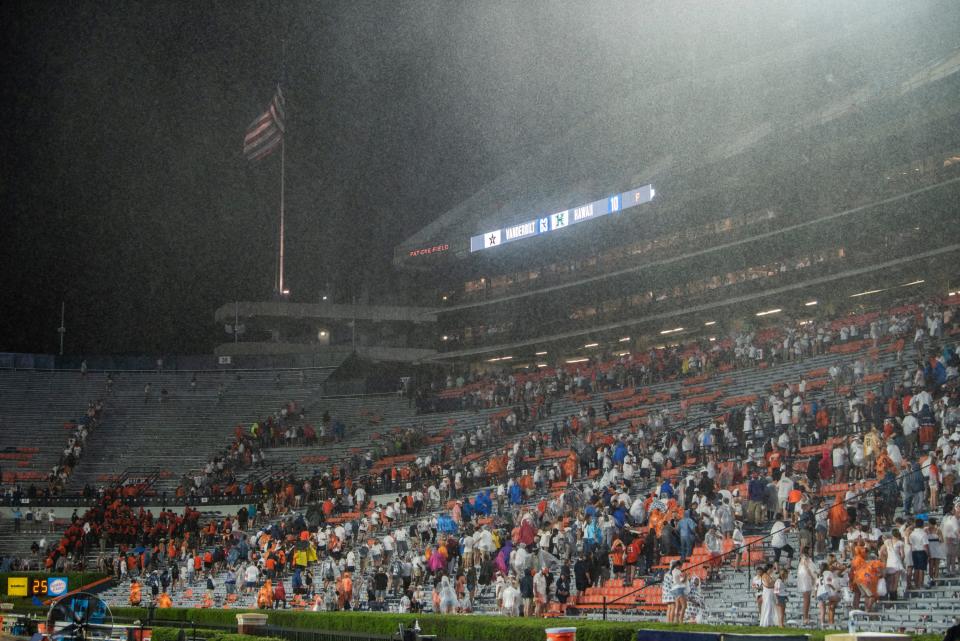In new Auburn football season, heat plan intensifies, storm plan goes into practice
AUBURN — The events that transpired in the third quarter of Auburn football's 2022 season-opening win were all by painstaking design.
As storms galloped into eastern Alabama, the Lee County Emergency Management Agency monitored lightning's distance from Jordan-Hare Stadium, where an announced attendance of 84,562 watched the action on the field, more focused on who Auburn's quarterback would be the rest of the season.
Soon all those fans would be asked to evacuate the metal bleachers and the stadium entirely. Lightning within eight miles sparked a chain of communication ending in AU's "Unified Command" activating weather delay procedures. Campus buildings surrounding the stadium were unlocked for spectators to take shelter as a downpour ensued, and the stadium was open for reentry by the time 30 minutes passed without lightning detected within the radius.
GAMEDAY CUSTOMSThe Spirit of Auburn football: 2021 return of 'War Eagle' from COVID year also meant one bird's bittersweet last flight
AUBURN PLAYERSFor Donovan Kaufman, 9 years of football without dad in the stands ends in Auburn season opener
Everything from severe weather to potential bomb threat security on gameday is overseen by campus officials who specialize in emergency management. Football Saturdays are the biggest events in Auburn. Every one of them is planned for weeks in advance.
"Our security is layered in the sense that we have a great deal of responsibility, and we look at everything from the ground up," said AU executive director of campus safety Kelvin King, who previously spent 27 years at the FBI. "We look from the ground up to the sky. ... Anything that might impact the gameday experience."
Local, state and federal agencies are involved, with Auburn PD, Opelika PD and the Lee County Sheriff's Office all supplying personnel. Lee County EMA is able to supply equipment and other state resources that the university doesn't own itself.
How many people are involved in the field and behind the scenes?
“Hundreds," Auburn assistant police chief Clarence Stewart said. "I can literally say hundreds.”
“I would just say less than a thousand," King said.
As the lightning plan went into practice last week, Auburn has intensified another one of its weather plans while also staying on alert for more serious security with campus bomb threats in the news this summer.

Why Auburn built more comprehensive heat plan for football games in 2022
Floyd Johnson was a Big Ten guy before Auburn. His previous jobs were at Michigan and Iowa.
Midwest heat is one thing. Southern humidity is another.
Especially considering the way Auburn's schedule lined up in his first full year as director of emergency management.
"You look at the heat that we’ve had over the summer – it’s been pretty hot – and then you look at five games back-to-back-to-back in the hottest portion of the season. Hey, that’s gotta be our priority. Mitigating that threat."
His team decided to increase the resources available to fans. Previously, two cooling stations were available at football games. Now there are eight, with five on the Jordan-Hare Stadium concourse and three outside the building. The cooling areas include water-filling stations, mist fans and spaces to rest in shade for a break from the sun exposure inside the stadium bowl. The cooling zones will be deployed when the heat index is expected to surpass 90 degrees. Fans have required medical attention in the past.
"The enormous amount of people that show up at that stadium and how it’s packed," Stewart said, "you wouldn’t believe the number of calls we get for (heat-related illness)."
"People will be able to sit down, cool off," Johnson said. "The idea is to help people put the situation in their own hands and give them the tools they need to prevent those injuries."
Defending against bomb threats on football gamedays
In July, Auburn received a bomb threat on campus. It amounted to nothing, but the risk is always on the minds of security specialists, especially on the community's busiest days of the year: football Saturdays.
Administrators are understandably hesitant to share security plan details for fear of it being compromised, but law enforcement measures include K-9 units and air monitoring equipment. Johnson leads table-top exercises with security staff and hires actors to participate in more specific simulated drills.
Stewart encourages fans to always be vigilant if they see anything suspicious: the old "see something, say something" motto. In his 20-plus years with Auburn PD, there hasn't been a gameday threat.
The tricky balance, of course, is keeping in mind that fake threats do happen. And causing a panic among 80,000 fans is also dangerous. It helps to have federal resources available in evaluating risk.
"There are people that investigate those threats. So the FBI has taken the lead," King said. "Have assigned one single field office as a point of contact for investigating collegiate bomb threats. We’re going to listen to what the intelligence is and still make the best decision possible with the information that we have. Do we do it in a vacuum? Absolutely not."
This article originally appeared on Montgomery Advertiser: Inside Auburn football's stadium security plan: heat, storms and more

